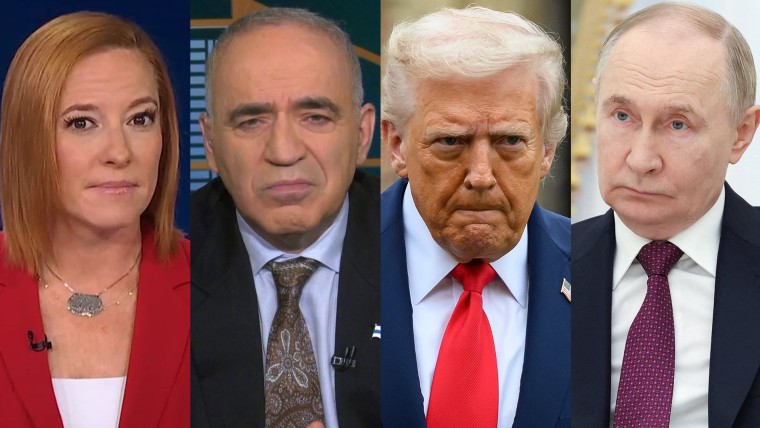This is an adapted excerpt from the Sept. 18 episode of “The Briefing with Jen Psaki.”
In 1999, the Russian puppet comedy show “Kukly” ran a sketch depicting then-Russian President Boris Yeltsin. The leader can be seen cradling a screaming demon-baby version of his successor, Vladimir Putin, and crying over the future of his country’s democracy. It was funny and irreverent. And it was trenchant about Russia’s future in the way that only good political satire can be.
One year later, in 2000, just after Putin was officially inaugurated as president, the program ran another sketch. This one imagined Russia in the year 2020 with Putin still in office and ordering raids on the show’s parent company.
The show correctly predicted that Putin would continue his hold on power in Russia 20 years later. But “Kukly” underestimated how quickly Putin would go after his comedy critics. Not long after that sketch, the Kremlin pressured the network to take the show off the air.
That might not come as a surprise today — after all, Russia is a state where freedom of speech is strictly limited, the media is censored by the state, and a number of Putin’s critics have wound up dead.
But at the time, Russia’s future as an authoritarian state was not so certain. In an op-ed published Thursday, Russian writer and chess legend Garry Kasparov wrote about the comedy puppet show as an “early casualty” of Russia’s censorship regime.
“Many of the Russian government’s targets were never actually arrested or charged with any specific offense,” Kasparov wrote. “Many more were never targeted at all! A few high-profile people got shaken down and everyone else got the message. A general chill spread over the country’s media, but it took a while to entirely freeze over.”
When a country begins to slide into authoritarianism, its leaders don’t just come right out of the gate and start throwing people out of windows or poisoning them with Novichok. They target their critics in more subtle ways, and their targets are not always opposition leaders or truth-telling journalists. Often their targets are comedians, who have the power to pierce a dictator’s veil of invulnerability in ways that few others can.
You see evidence of it in regimes all over the world. In 2023, China fined a comedy company more than $2 million, accusing it of “harming society,” after one of its comedians made a joke about the military. Comedians in Iran, Malaysia, Kazakhstan and elsewhere have been frequently targeted for undermining the state.
When I joined the Obama State Department in 2013, one of the first international issues I remember the team dealing with was Egypt’s attempts to censor a late-night comedian named Bassem Youssef, who was being targeted with an investigation for comments he made on his program.
Now our country is grappling with its own battle over freedom of expression. ABC has pulled late-night host Jimmy Kimmel off the air indefinitely after criticism from Donald Trump’s Federal Communications Commission chair over comments the comedian made about the death of Charlie Kirk.
It follows a similar decision by Paramount to end “The Late Show with Stephen Colbert” shortly before the Trump administration approved a merger for the show’s parent company.
Often their targets are comedians, who have the power to pierce a dictator’s veil of invulnerability in ways that few others can.
Are those decisions early warning signs about the future of free expression in this country? It sure feels like it. And if so, what can we learn from other countries where freedom of expression has already been eroded?
As Kasparov wrote in a separate piece published earlier this week: “As demagogues go, Donald Trump is not especially original. A tragedy occurs. The leader starts pointing fingers and blames the other guy as a pretext for overreach. It’s so formulaic that no TV show with this plot would ever have made it near this past weekend’s Emmys.”
Kasparov warned that we should understand this for what it is, “a threat to the American opposition’s constitutionally-protected free speech rights.”
But he also offered a sign of hope that the U.S. may not suffer the same fate as Russia’s slide into autocracy: “Russia had no democratic immune system to fight the virus. America does.”

